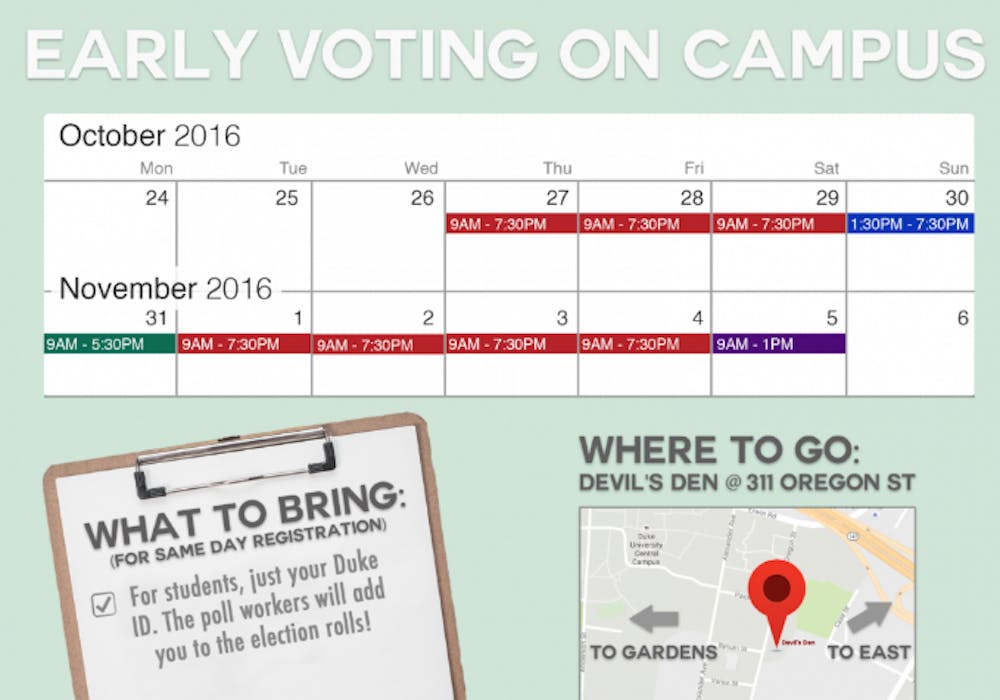Before election day arrives, The Chronicle spoke with Samuel Gedman, interim director of elections at the Durham County Board of Elections, to compile a guide for voting on Duke’s campus.
Where and when
The Devil’s Den on Central Campus: 311 Oregon Street, Durham, NC 27705
10-day early voting period: October 27 until November 5
- Thursday, October 27: 9:00 a.m. - 7:30 p.m.
- Friday, October 28: 9:00 a.m. - 7:30 p.m.
- Saturday, October 29: 9:00 a.m. - 7:30 p.m.
- Sunday, October 30: 1:30 p.m. - 7:30 p.m.
- Monday, October 31: 9:00 a.m. - 5:30 p.m.
- Tuesday, November 1: 9:00 a.m. - 7:30 p.m.
- Wednesday, November 2: 9:00 a.m. - 7:30 p.m.
- Thursday, November 3: 9:00 a.m. - 7:30 p.m.
- Friday, November 4: 9:00 a.m. - 7:30 p.m.
- Saturday, November 5: 9:00 a.m. - 1:00 p.m.
Unlike the primaries in March, which were held at the Freeman Center for Jewish Life on Campus Drive, early voting for the general election will be held at The Devil’s Den on Central Campus.
The voting window at the Duke site is for ten days, like it was during the primary.
Michael Schoenfeld, vice president for public affairs and government relations, said this new location met the requirements of election officials.
He added that the Freeman Center sufficed for the primaries but was too small for the general election, and that both Duke and election officials wanted to have a secured space dedicated to voting that was accessible and also convenient.
On election day, students registered at their East Campus address vote at George Watts Elementary School. Students registered at West and Central addresses will have to vote at the Patterson Recreation Center. Others can check their polling place here.
Earlier this month, an appeals court struck down provisions of North Carolina’s voter identification law. Because of the ruling, same-day registration is now possible, Gedman said.
Same-day registration:
- You will need to have some documentation that includes the address you reside at in Durham County—called a HAVA (Help America Vote Act) document. UPDATE: Students living on campus can use their student ID as their HAVA document.
- Possibilities include: a utility bill, a bank statement, property tax bill or automotive registration.
- If you do not have identification featuring your Durham County address, you will not be able to register during the early voting period.
Registering beforehand:
- No photo identification required when coming to vote, provided that you provide the last four digits of your SSN on the registration form or your North Carolina Driver's license number.
- More information on how to register in the next section.
How to register beforehand
Go to the North Carolina Board of Elections website and print out the voter registration form: http://www.ncsbe.gov/voter-info
You do have to re-register if you are registered to vote in another state OR in a different North Carolina county. You also have to update your registration if you change your campus address (East to West or Central, for example) or move off-campus.
Follow the form’s instructions carefully as usual, but some things to know and watch out for:
- For East Campus, the address is 1 Duke University East Campus, zip code 27708
- For West Campus, the address is 1 Duke University West Campus, zip code 27708
- For Central Campus, you put your actual street address, zip code 27705. This serves as the mailing address as well.
- Mailing address for East and West Campus residents is your box number—available on ACES—with a 27708 zip code.
- You do not need to provide proof of address at the voting booth as long as you fill out one of the identification options in Section 3 of the form.
Once done, mail the form to Durham County Board of Elections, P.O. Box 868, Durham, NC 27702-0868 using your mailing address as the return address.
Gedman said cancelling your previous registration, either in another state or another North Carolina county, is not mandatory but is recommended. There are procedures by which citizens or groups can challenge voters, so to be safe, he recommended cancelling registration elsewhere.
It is a felony to vote in multiple states or counties.
To cancel your voter registration elsewhere, contact either your home county or your home state’s Board of Elections for further details. If you choose not to cancel your registration elsewhere, Gedman explained that the cancellation will occur eventually but nonetheless could be risky.
“It will be done eventually, but it’s not something the student is responsible for doing immediately, but it’s a good idea,” he said.
Get The Chronicle straight to your inbox
Signup for our weekly newsletter. Cancel at any time.

